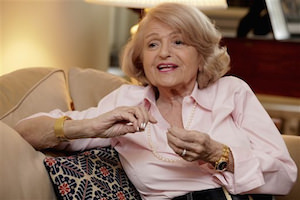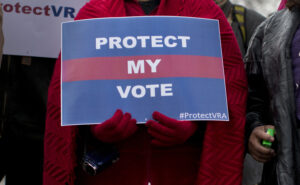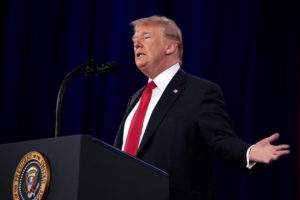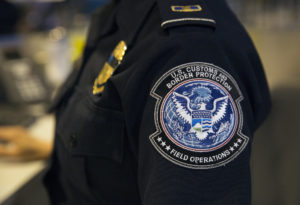Truthdigger of the Week: Edith Windsor
Thanks to 83-year-old Edith Windsor, lesbians, gays and their supporters this week got a little closer to having their day in court.
Democratic President Bill Clinton signed the Defense of Marriage Act into law in fall 1996. The measure has prohibited the federal government from recognizing the legal rights of same-sex married couples. Today, 130,000 such couples exist in the country, all of whom constitute what Marc Solomon, national campaign director of the group Freedom to Marry, calls “legal strangers”: Their rights as married people don’t exist in the context of upward of 1,100 legal scenarios, including taxation.
Edith Windsor, 83, lost her wife in 2009. She married Thea Spyer in May 2007, 40 years after they became engaged. In 1975 Spyer was diagnosed with multiple sclerosis. Despite the disease, the two remained committed to each other and Windsor cared for Spyer as her MS progressed and forced her into a wheelchair. They were wed in Canada by Justice Harvey Brownstone, the country’s first openly gay judge. Their life was the subject of a documentary called “Edie & Thea: A Very Long Engagement.”
When Spyer died, the federal government informed Windsor that she would be required to pay estate taxes amounting to $363,000. Windsor was deeply upset. She sought the help of numerous gay rights groups. No one was willing to accept her case until a referral led her to Roberta Kaplan, a partner at the major international law firm Paul, Weiss, Rifkind, Wharton & Garrison. Kaplan had won a case challenging the prohibition of same-sex marriage in New York before the state’s Court of Appeals in 2006. Kaplan didn’t hesitate to take up Windsor’s cause. “When I heard her story, it took me about 5 seconds, maybe less,” she said. With Kaplan on board, the American Civil Liberties Union joined the effort. They filed their complaint in November 2010.
In legal time, the government’s response was virtually immediate. In February 2011 Attorney General Eric Holder announced that the Obama administration would no longer defend the constitutionality of DOMA’s Section 3, the part that prohibited same-sex couples from receiving federal marriage benefits. Four months later, a lower court judge ruled that the section violated Windsor’s equal protection guarantees enshrined in the Fifth Amendment. The court ordered that Windsor’s tax payment be returned. She was ecstatic. “It’s thrilling to have a court finally recognize how unfair it is for the government to have treated us as though we were strangers.”
But the team didn’t stop there. In October, the 2nd U.S. Circuit Court of Appeals upheld the lower court’s ruling, saying: “It is easy to conclude that homosexuals have suffered a history of discrimination.” The tribunal was the first federal appeals court in U.S. history to announce that any law basing its distribution of rights on sexual orientation should be subjected to judicial scrutiny.
In September 2012 the Justice Department filed a petition for the decision to be reviewed by the Supreme Court. The court accepted in December and heard oral arguments three months later, on March 27. Windsor spoke to the court as the lead plaintiff. The group’s argument appears to have been convincing. Justice Anthony Kennedy, considered to be the swing vote in the case, seemed ready to deny the federal government’s jurisdiction over the matter on the basis that decisions over marriage should be left to the states.
SCOTUSblog, which followed the case closely, gave DOMA an 80 percent chance of being overturned. The New Yorker foresaw such a decision as having far-reaching legal consequences: If the court decides that any law that grants or withholds rights based on sexual orientation should be closely inspected, a lot of measures that treat gay people differently from straight ones would be called into question.
After the day’s arguments, Windsor addressed reporters on the steps outside the courtroom. On her lapel she was wearing the engagement brooch Spyer gave her in the 1960s to avoid uncomfortable questions about whom she intended to marry. When reporters asked her to predict an outcome to the case, Windsor said: “I think it’s going to be good.” When asked why more people seem to be accepting of gay marriage today than they were when she and Spyer wished to get wed four decades ago, she answered: “As we increasingly came out, people saw that we didn’t have horns. People learned that, OK, we were their kids and their cousins. … It just grew to where we were human beings like everybody else.”
For leading a crucial, long overdue march for the rights of same-sex married couples to be recognized by the federal government, and for honoring the memory of her deceased wife Thea, we pay tribute to Edith Windsor as our Truthdigger of the Week. See segments from their film below.
— Posted by Alexander Reed Kelly.
“Democracy Now!”:
C-SPAN:
Your support matters…Independent journalism is under threat and overshadowed by heavily funded mainstream media.
You can help level the playing field. Become a member.
Your tax-deductible contribution keeps us digging beneath the headlines to give you thought-provoking, investigative reporting and analysis that unearths what's really happening- without compromise.
Give today to support our courageous, independent journalists.






You need to be a supporter to comment.
There are currently no responses to this article.
Be the first to respond.